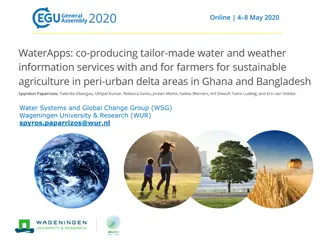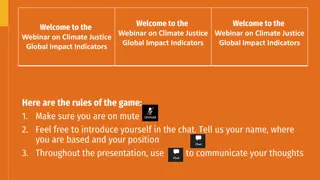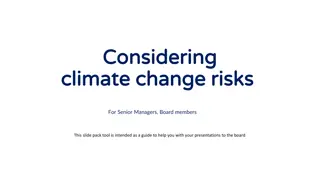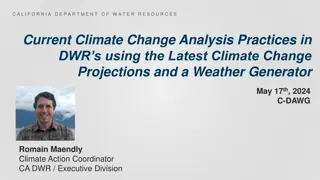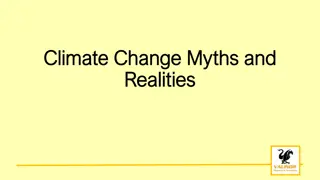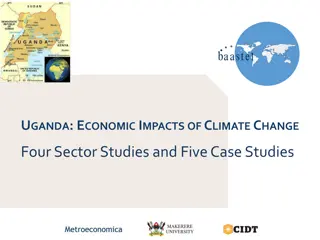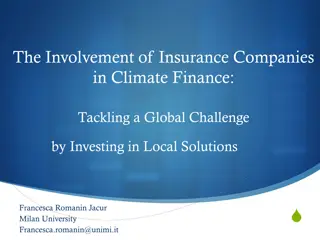Tips to Save Water and Combat Climate Change
Water conservation is crucial for energy efficiency and climate change mitigation. This article discusses the interconnectedness of water, energy, and climate change, emphasizing the importance of saving water through practical tips like reducing shower time, fixing leaks, using water-efficient appliances, and promoting rainwater harvesting. By adopting these tips, individuals can contribute to water preservation and climate resilience efforts.
Download Presentation

Please find below an Image/Link to download the presentation.
The content on the website is provided AS IS for your information and personal use only. It may not be sold, licensed, or shared on other websites without obtaining consent from the author.If you encounter any issues during the download, it is possible that the publisher has removed the file from their server.
You are allowed to download the files provided on this website for personal or commercial use, subject to the condition that they are used lawfully. All files are the property of their respective owners.
The content on the website is provided AS IS for your information and personal use only. It may not be sold, licensed, or shared on other websites without obtaining consent from the author.
E N D
Presentation Transcript
StudyMafia.Org Save Water Submitted To: Submitted By: Studymafia.org Studymafia.org
Table Contents Definition Introduction Tips to Save Water Why Save Water? Conclusion 2
Definition Water is inextricably linked to energy and climate change. Energy is required for pumping and treating water that we get at home. Pumping and treating wastewater is energy intensive. 3
Introduction Climate change will also impact freshwater supply. Global warming is resulting in shifting rainfall patterns, an increase in the number of dry days, torrential rainfall over short periods of time, and extreme weather events, all of which increase the likelihood of droughts and floods. Water is expected to be a major source of conflict in future because demand is soaring and freshwater reserves are severely stressed.. 4
Tips to Save Water Take shorter showers to reduce water consumption. Check your water bill to see how much water you are using. Check all faucets, pipes, and toilets for leaks. Use mug instead of running the tap while brushing teeth or shaving. Use a toilet flush which consumes less water. Water your plants early in the morning or late in the evening to reduce water loss due to evaporation. 6
Tips to Save Water While watering plants, use watering-can instead of a running hose. For watering plants, use waste water that comes off washing of food items. Use water efficient sprinkler and drip irrigation for your garden. Promote drip irrigation and other water conservation methods in agriculture. Practice rainwater harvesting. RWAs should adopt this in every public park of their locality. 7
Tips to Save Water Make sure you have a faucet aerator on each faucet. These inexpensive appliances conserve water, keeping water pressure high. Make roof top rain water harvesting and recharging wells/ tanks mandatory. Utilize kitchen waste water for home gardening. Wash utensils using collected water in a bucket instead of washing directly under the running tap. Instead of washing mop the floor 8
Tips to Save Water Select village level volunteers to check whether all the public taps and pipes are leak free. Promote Eco-san toilets : a closed water - less system Skip rinsing dishes before using your dishwasher and save water in each load. Don't allow water overflow from the overhead tank. Don t wash the clothes and kitchen utensils in the water bodies. Don t throw waste in water bodies. 9
Tips to Save Water Run your dishwasher, washing machine, and dryer only when you have full loads. Dry clothes in sunlight Make water saving devices in taps mandatory. Use rejects of your RO for toilet flushing. Make percolation pits appropriately in backyards and parking . Avoid concrete pavements inside the compounds. 10
Tips to Save Water Use less fertiliser on your lawn better use compost than chemical fertilisers. Set your sprinkler to keep the water on the lawn. Mulch around your landscaped area. A three-inch layer of mulch holds moisture and prevents evaporation, and conserves soil moisture thus reducing the need to water. Sweep your driveway and sidewalk instead of cleaning with water 11
Why Save Water? Water grows food It protects our ecosystem and wildlife Less water usage means more savings Water supply is already limited Conserving water also saves energy We need it not only to sustain us but our way of living. 12
Conclusion Earth is the only known planet in this universe where life is possible only because of the availability of water and oxygen. Water is most important necessity of life for all the living beings on the earth. Without water no one can exist even for a day. 14
References Google.com Wikipedia.org Studymafia.org Slidespanda.com
Thanks To StudyMafia.org

 undefined
undefined















